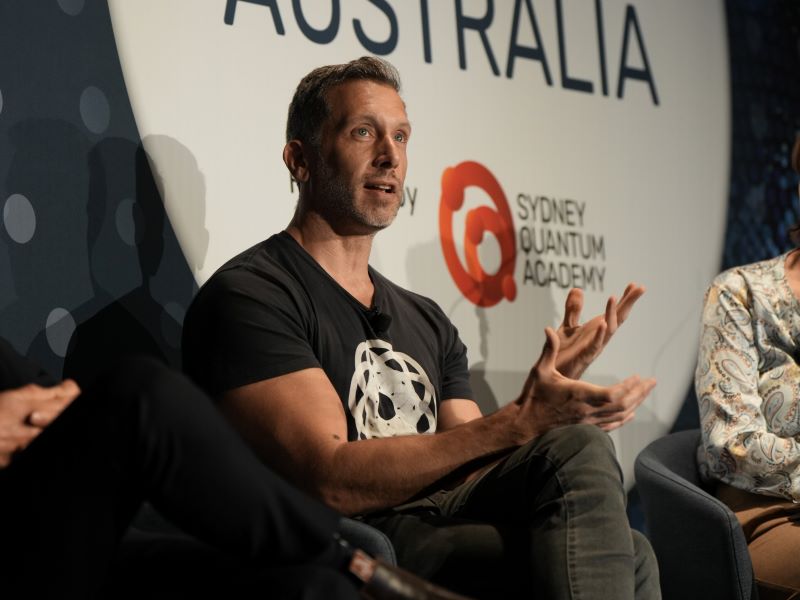Australia can play a major role across emerging global quantum supply chains and must not resign itself to being a niche player, Q-CTRL founder Professor Michael Biercuk says, urging the sector to aim high and the federal government to do more on Tuesday.
“Stop having small ambitions,” Professor Biercuk told the Quantum Australia event in Sydney, attended by around 700 delegates from academia, startups and government.
“We’re not going to be providing screws to the F-22 [aircraft]. We can be one of the biggest providers of all sorts of different parts of the quantum value chain… What we all benefit by recognising is that quantum technology — it is the opportunity for Australia to sit at the big kids table internationally. And I actually can’t think of another one.
“This is the one time where the Americans and the British and the Europeans all come to Australia… and say ‘we want all of that’. And so our ambitions should be as big as that opportunity.”

After decades of quantum research and more than $1 billion of government funding, Australia’s quantum sector is at approaching a tipping point and the Sydney University Professor and Q-CTRL founder argues many companies could become global leaders if the nation gets it right.
He envisions Diraq, a UNSW spinout, providing silicon quantum computers which are enhanced by Q-CTRL infrastructure software and running quantum application developed by members of the UTS-led Australian Quantum Software Network. Error correction could be done with the outputs of world-leading research at Sydney University while a company like Canberra-based Quintessence Labs could provide its cyber security.
“We have this opportunity to be everywhere in the value chain. And of course, by having partnerships with allied nations, this is how we become core suppliers,” Professor Biercuk said.
But to get there Australia needs action, he said, echoing the call of Australia’s chief scientist Dr Cathy Foley for the sector to take “audacious” steps.
Professor Biercuk, who was speaking on a lively panel at the Quantum Australia event organised by the Sydney Quantum Academy, took exception to suggestions Australian governments may need a conservative approach to supporting quantum until use cases become clearer.
“Everybody says this is a strategic asset [for Australia]. And the Australian Government says, ‘maybe we’ll do something, [maybe] we’ll do something’. Why is there so little certainty when everybody in the world says the same thing?”
Professor Bieurcuk said while state government’s may be restrained in offering the large direct support local quantum companies need, the Australian government has little excuse.
“Given that the Australian government spends $11 billion a year on tax concessions for property investors, I guarantee they can make that much of an investment.”
The long runways for quantum technologies make government support critical, he said, noting governments acting as a customer is a legitimate but underutilised strategy in Australia.
Unlike in Europe, where Q-CTRL “copycats” have been able to fund their development with government contracts rather than raise private capital and surrender some control of the company to investors, he said.
“The government acts as a customer. They say ‘we want what you have to offer. We want your software, we want your hardware’, whatever it is that’s being offered.”
Governments also play a unique role in bridging the deep tech “valley of death”, before a product or service is ready to sell, according to Professor Biercuk who worked as a technical consultant at DARPA, helping steer investment at the US Department of Defence’s $5.5 billion advanced research agency for several years before moving to Australia and spinning Q-CTRL out of Sydney university.
“The only way to bridge that very long time horizon, which can occasionally be a decade or more, is when the government steps in and addresses what is a market failure. It is a market failure,” Professor Biercuk said.
“When world changing technology is not supported by, say, private capital, in order to deliver the ultimate outcomes. So, government demand is the bridge and the most important thing that we have seen around the world in the last few years is government demand generates private sector investment.”
Currently the main Commonwealth funding for quantum companies is expected to come from the National Reconstruction Fund, but the sector will be competing with other critical technologies for a share of the $1 billion set aside for enabling capabilities and Professor Biercuk says more is needed.
An upcoming National Quantum Strategy and reviews to higher education funding also provide opportunities for change in how the Commonwealth supports quantum.
InnovationAus.com is a media partner of the Sydney Quantum Academy.
Do you know more? Contact James Riley via Email.

